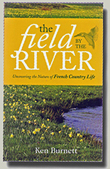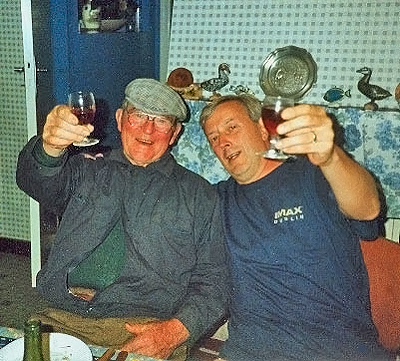| |

Blog/book excerpt
from
Ken Burnett, writer, publisher and occasional fundraising consultant.

These articles are reproduced from
The Field by the River by Ken Burnett, published in hardback and paperback by Anova Books Limited, London.
Now available in Kindle, download and enjoy today.
‘I realise that perhaps we’ve come too far, and getting my friend home now will not be easy. Grasping him by the hand, guiding his feet over obstacles, gently steering him by the arm I take my silent troubled friend slowly, painfully home where Angèle greets him at his front gate, her eyes filled with tears.’

‘Then I take to the field, to walk a bit more with my dogs and try to make sense of what it is that is stealing my great friend. ...Mathurin lives on, but the real Mathurin has gone and I know he’ll never, ever come back.’

For more about the field by the river read The deaf dumb and blind kid,Rough sex down by the river, Animal intelligence and The adventure of the five white bulls.
For more on the book The Field by the River, click here.
 Ken Burnett can be followed by clicking the button above. Ken Burnett can be followed by clicking the button above.
More blogs on fundraising and communication
• Is it time for Twitter suicide?
• The future of fundraising.
• Is direct mail dead?
• The donor pyramid isn’t well either.
• The fundraising dream team
• The indispensable guard book.
• Prepare for the fundraising trustee.
•The transformational fundraising entrepreneur.
Home page
|
|
From chapter 4, November. A paysan’s Saturday night.
I thank the stars above Kerkelven, my rural home in Western France, that for the past fifteen years and more I have had the good fortune to know and be befriended by my neighbour, Mathurin le Belligo, retired farm labourer of this parish. He’s at a great age now, is Mathurin and for the last three of these years he’s not been well. But you’ll be well advised to get to know Mathurin, for he is unlike anyone else I’ve ever met.

Mathurin, Angèle’s husband, father to Philippe, Pascal and Marie-Laure is, I think, one of a dying breed, a true man of the soil. He’s a manual worker, someone you could easily call a peasant but it would be a rich compliment, no insult whatsoever. The first time I met Mathurin I noticed how tightly he held my hand in friendship and for a little longer too than was comfortable. But he also held me with his eyes and I couldn’t fail to see in these bright blue pools the warm, impish delight that he was taking, just from meeting me. Mathurin’s handshake was firm, sincere, his hands worn, tough but gentle, his grip the steady, sure grip of someone who instantly, genuinely, has taken a liking to you, yet unassumingly anticipates that you, too, will take to him equally. His time, with which he’s generous, he gives to you alone.
From Mathurin I’ve learned a lot, but most valuably he’s taught me to appreciate that there’s nothing worth more in this life than an honest and true friend. And there’s no one to be envied more than he who is sincerely, simply happy and wants for nothing but that which he has already.
Simple though his life might seem, my neighbour Mathurin is one such man, ‘an honest man, the fairest work of God’, as the poet Burns put it. And quietly contented too.
Other than a brief sortie to play his part in a foreign war, Mathurin has spent all his life within the boundaries of our Breton commune. He was born a few kilometres from here. Angèle has never travelled further than a day’s journey by car. Everything they need or want is close by, within easy reach, including his now extended family, who all live an easily achievable drive away, or less.
Until his retirement 25 years or so ago Mathurin was a tenant farmer, a locataire, owning no land himself but working land owned by others, or he worked for others as a daily-rate hired hand. In such spare time as he had he needed to work his small field, his extensive vegetable garden, for to survive and raise his family he had to be self-sufficient in garden produce. He raised his own chickens, ducks, guinea fowl and rabbits too. A heavy manual toil was Mathurin’s daily lot, but I never saw him without a smile nor ever heard him utter either complaint, criticism, or cross word. His day’s work was unremitting and thinly rewarded, yet to all who knew him Mathurin seemed to be the picture of happiness, passing each day with his cheery round red face wreathed in smiles of deep contentment.

Mathurin’s cheerful hospitality was always infectious and irresistible. Despite his own retired state, he’s always been a great respecter of our need to work. Yet almost invariably whenever he saw us he’d invite us round for coffee. We always knew coffee was not uppermost in his mind and most of the time we’d decline but every now and then it was our great pleasure to accept and pass the afternoon in the genial company of Mathurin and wife. Then we’d wave goodbye to the rest of the day, because an afternoon of coffee with Angèle and Mathurin would lead unfailingly to everything else being put on hold. The eau de vie (his own make, of course) and the robust St Emilion would appear, sometimes accompanied by homemade cider and the local apple wine (pommeau). However warm the weather or hot their kitchen was from its wood burner, Mathurin was rarely seen without his cap at a jaunty angle and his shirt buttoned to the neck under a thick woolly jumper. Often the sweat would roll off him as he passed the glass around, but when I’d suggest he try shorts and a tee shirt like me he’d laugh as if it was the finest joke he’d ever heard. Conversation with Mathurin and Angèle was always easy, usually chock full of scurrilous local gossip, or considered analysis of international politics.
I’ve seldom if ever known a couple happier with each other than Mathurin and Angèle and this was doubly evident when they were in a group as at the fete du quartier, or with their family. We celebrated their golden wedding together and later equally enthusiastically we enjoyed Mathurin’s eightieth birthday. These celebratory gatherings were priceless times and it was a privilege indeed for Marie and me to share in them. Outsiders we unquestionably were but we were never allowed to feel it, even for a moment. To pass a Saturday night with the Le Belligo family is to celebrate the past week in a simple, homely way, a tradition that perhaps once would have been found frequently in rural communities across Europe but now is a rare, precious and a dying thing. Though to us it seemed they would and should continue forever, we were fortunate indeed to see them as they should be, in their heyday.
Continued top of column 2
From pages 153 to 158 of The Field by the River, © Ken Burnett 2009. All of the delightful drawings are by Juliet Percival, her original illustrations for this book.

Ken Burnett’s other books mainly focus on fundraising, communication and the wider universe. They include the classic Relationship Fundraising: a donor-based approach to the business of raising money and The Zen of Fundraising. For information on all Ken’s books, click here. To order your copy of The Field by the River, £12.99 (US$21.00) plus P&P hard cover, £7.99 (US$13.00) paperback, click here.
|
|

Pierre and me in distant, happier days. I called him Mathurin only in the story, his real name was Pierre. Everything else about him is real too.
Continued from column 1
We were all then entirely unaware how soon these happy times would be shattered by the insidious condition that was even then creeping unexpected and unseen upon our great friend Mathurin.
Mathurin my neighbour and the man I most admire has been diagnosed as having Alzheimer’s disease. Unimaginable and unbelievable as it was, this news was easy to deny at first, for it wasn’t easy to detect. Then with terrifying speed it became all too unmistakeable. Mathurin started to wander away in the evenings and we joined the subsequent searches in cars, on bikes and on foot, across the neighbouring countryside. Thankfully we always found him well and full of purpose, but in his mind on an errand to meet friends long dead, or to find his horse, which he hasn’t had for three decades, or to walk into town on a path long disused and dangerous to a man his age.
Steadily, inexorably and much too quickly Mathurin’s condition deteriorated until he became unpredictable and couldn’t be left alone. The pain and injustice of this tragic turn of event stung everyone except Mathurin himself. We had already begun to lose him, and there was no going back.
With Angèle’s grateful blessing I take my old friend for our last walk together. He knows me still and comes happily with me now, smiling even though with a distant, detached look upon his face. This won’t last and I feel we both know it. We start out as usual in easy conversation, but soon it dies and I’m struggling to keep talking, questioning him, pressing for responses, searching to maintain dialogue when it’s quickly turned to monologue. The walk, unlike so many previous walks is not turning out as I had hoped. I have no option but to turn for home. I realise that perhaps in this condition we’ve come too far, and getting my friend home now will not be easy. Grasping him by the hand, guiding his feet over possible obstacles, gently steering him by the arm I take my silent troubled friend slowly, painfully home where Angèle greets him at his front gate, her eyes filled with tears. I leave the near empty shell of my good friend with her, she who will never judge or condemn him but will just be there always to do what’s needed. Ever so gently and slowly she turns him, inch by inch, and leads him in to the house, to the room, to the fireside chair that will now become his world.
Then I take to the field, to walk a bit more with my dogs and try to make sense of what it is that is stealing my great friend.
I know he’s going, that I can’t go there with him and that I’ll not see his likes again. Before long, Mathurin won’t know me at all. He won’t remember any of the times we’ve had, but by then he won’t recognise anyone, even his closest friend Bertrand, even his sons. The kindly smile is already gone, replaced by a vacant, uncomfortable, worried look. The funny, sharp, attentive mind I loved and admired so much has also gone. The most gentle of men is still gentle, but now he sleeps away most of his days detached from and even oblivious to his surroundings and the people and the world he so loved.
Mathurin lives on, but the real Mathurin has gone and I know he’ll never, ever come back.

Angèle too knows in her heart that the Mathurin she has lived with and loved these six decades has gone. This may be fact, but it’s a fact she’ll never accept. While his current mental state may deteriorate even further, Mathurin may be fit enough to live on for a very long time, his physical body still with us while his mind, character and personality have all long gone. To Angèle, that’s just confirmation that he still needs her.
Though she can’t lift him, she can do everything else for him. Supported by the social services and her ever-constant family, Angèle accepts her new lot without complaint. She wouldn’t have it any other way.
Three years have passed since Mathurin and I took our last walk together. I see him but occasionally now and I no longer cling to the hope that I’ll detect a spark of recognition for me in his vacant gaze, for I now know it isn’t there. But Angèle’s unfailing courage encourages me and all Kerkelven’s people to accept that Mathurin is still with us. We have to be grateful for that.

Want to comment on any of this?
Have your say here. Email your comment now to Ken..
|










